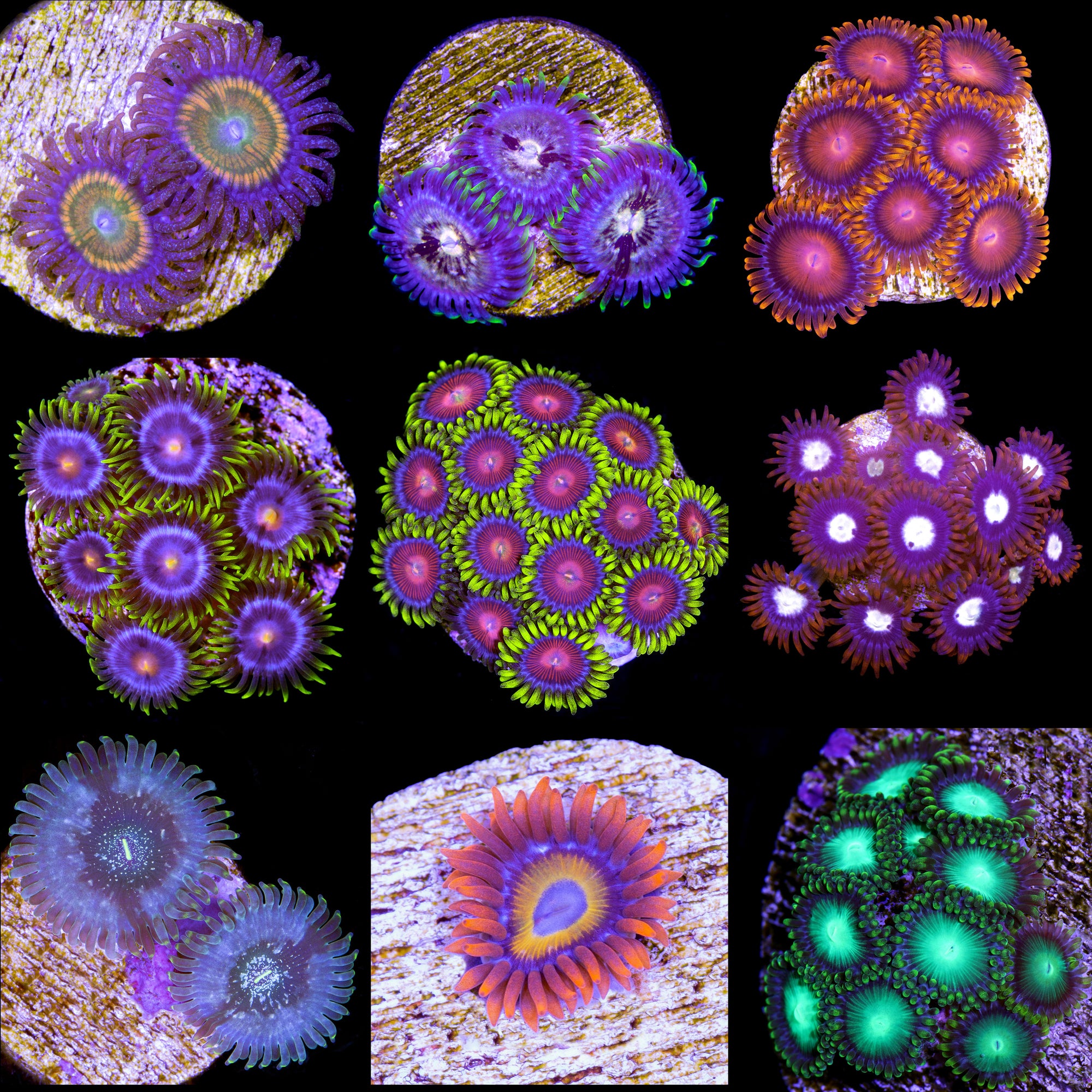Everyday low prices. Free Shipping Over $249. Or $29.99 Flat Rate Over $100
Assorted Zoanthid Coral Frag Packs
$ 27.99 $ 42.99
Please select all options.
How to Care for Zoanthids:
(written by Dave Burr)
Please Note: You can choose how many frags you want your Zoanthid Frag Pack to include. The photo is a representative photo. You will receive a mixture of types and colors of zoanthids. Each frag will have 1-3 polyps depending on type of zoanthid. Vivid Aquariums will pick the pack for you based on our current inventory.
Zoanthids are easy to keep and are a great choice for the beginner. Zoanthids and Palythoa will grow and reproduce by budding.
Placement: Mount the Zoanthids using IC gel glue, or putty, on an exposed rock lower in the aquarium where they will receive direct flow and light. If you do not want them growing on your your main rock structure, try creating a Zoanthid island by mounting several types of Zoanthids and Palythoa to one larger rock and placing it as an island in your sand bed.
Feeding: Although symbiotic algae called zooxanthellae hosted within them supply most of their nutritional requirements through photosynthesis, Zoanthids do benefit from supplemental feedings of Oyster-Feast, Roti-Feast, cyclopeeze, & sometimes small bits of mini mysis. Target feeding gets the corals fed using less food while keeping your nitrates and phosphates lower.
Lighting & Flow Requirements: Zoanthids require moderate water flow and low to moderate lighting (PAR 100-250) to maintain their color. T5's, Metal Halides, or LED's can all grow Zoanthids and Palyhtoa when the proper PAR levels are provided. We recommend a 14-20K color spectrum for best coloration.
Care Level: Easy
Lighting Requirements: Low to moderate (PAR 100-250)
Water Flow: Moderate
Aggressiveness: Semi-aggressive
Range: Indo-Pacific
Family: Zoanthidae
Water Conditions: 75-80° F; sg 1.024-1.026 (1.025 is ideal); pH 8.1-8.4 Ca 420-440 ppm, Alk 8-9.5 dKH, Mg 1260-1350, Nitrates <10ppm, Phosphates, < .10ppm
Water Chemistry: It is important that proper calcium (420-440 ppm), alkalinity (8-9.5 dkh - run it 7-8 if you are carbon dosing) , and magnesium levels (1260-1350 ppm) are maintained. Raising magnesium levels gradually up to 1400-1600 ppm can help to combat algae outbreaks, just keep CA and Alk in line as you raise the Mg. Nitrates should be below 10 ppm and phosphates should be below .10 ppm. We recommend doing a water change when Nitrate levels rise to 10 ppm. It is important to replace your phosphate media when phosphates rise to .10 ppm. Media Reactors make the most efficient use of your phosphate media by fluidizing it.
Dosing: Vivid Aquariums uses and recommends dosing pumps to automate the dosing of additives and keep your levels more constant. A dosing pump can alleviate the chore of manually dosing your aquarium with Ca, Alk, & Mg 2,3, or 4 times per week and will benefit your aquarium by keeping your levels constant through frequent small additions of Ca, Alk, & Mg. Our tanks all progressed when we switched from 3 manual dosings per week to 70 automatic dosings per week and we got a lot more work done.
Category: 100-150, 150-300, 25-50, 50-75, 75-100, coral pack, easy, low to moderate, low-to-moderate-lighting, Polyps & Zoanthids, Sale, zoanthus-sp
Type: Corals and Inverts


